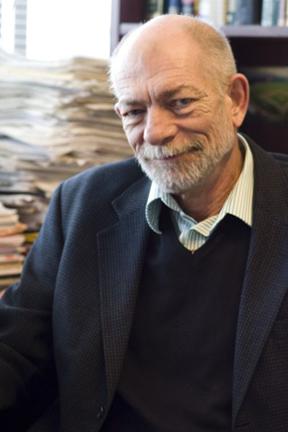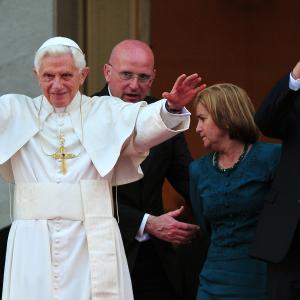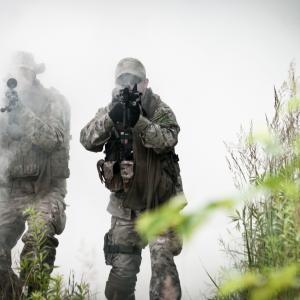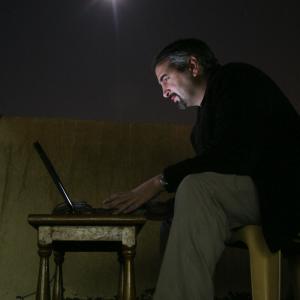
Duane Shank was Associate Editor for Sojourners magazine and was on the staff from 1995 to 2014.
Duane has been active as an organizer and administrator in the peace and justice movement for 35 years, beginning as a draft resistance and antiwar organizer during the Vietnam war. He has worked as a community organizer in the rural south, in interfaith coalitions, and in the nuclear weapons freeze and Central America solidarity movements of the 1980s. His positions have included Associate for the National Inter-religious Service Board for Conscientious Objectors; National Coordinator for the Committee Against Registration and the Draft; Deputy Director and Acting Executive Director for SANE/Freeze; and Research Fellow for the Institute for Policy Studies.
Duane attended Eastern Mennonite University. He is a Anabaptist/Mennonite, and currently an active member and serves on the worship leadership team of the Community of Christ ecumenical congregation in the Mt. Pleasant neighborhood of Washington, D.C. His views on faith and politics have been shaped by (among others), John Howard Yoder, Abraham Joshua Heschel, Martin Luther King, Jr., Dietrich Bonhoeffer, and Oscar Romero.
Duane is married to Ellen Kennel. They have a daughter, Celeste, a graduate of Goshen College, IN, the Medill School of Journalism at Northwestern University, and the University of Chicago Divinity School.
In addition to family, church, and work; his passions are baseball (Washington Nationals), blues (Buddy Guy and Stevie Ray Vaughan) and bluegrass music (Ralph Stanley), and barbecue.
Posts By This Author
Where Do Our Tax Dollars Go?
If you’re finishing your income tax return this week, here’s some food for thought.
The National Priorities Project provides three helpful graphs of the president’s proposed 2013 budget (see budget dashboard). The discretionary budget, the program spending on which Congress votes; the mandatory budget, programs such as Social Security and Medicare that are outside the budget process; and the total budget, combining the first two. The first graph shows, for instance, that 57 percent of the proposed discretionary budget is for the military.
When you’ve finished your return and know what your tax payment is, here is a calculator that produces a “receipt” showing how it will be spent. For an explanation, see here.
For me, tax time is that once-a-year personal realization that my priorities are not the same as the government’s. And that the political struggle to change the government’s priorities is important.
In the Stacks, April 5, 2012
Among my must reads are the Sunday New York Times Book Review and other book reviews I come across in various media outlets. There are too many books being published that I would love to read, but just don’t have the time. So, I rely on reading book reviews as one way of keeping in touch with what’s being written.
Here are my picks in this week’s books of interest.
Nuclear-Powered Drones
As if conventionally powered drones weren’t bad enough, a report has it that scientists are developing nuclear-powered drones that could stay in the air for months without refueling. In addition to the fact that this would make drones more efficient killing machines, it also increases the dangers from crashes. Drones are especially prone to crashing, and with a nuclear reactor, a crash would be “in effect turning the drone into a so-called dirty bomb.
The project has apparently been put on hold, with a research summary concluding that "none of the results will be used in the near-term or mid-term future," due to political constraints. But with the increasing reliance on drones by the military, I suspect it won’t be long before it’s resumed.
The Rev. Dr. Martin Luther King Jr. and Ultimate Sacrifice
Forty-five years ago today, the Rev. Dr. Martin Luther King delivered his now-famous speech at Riverside Church in New York City, declaring his opposition to the war in Vietnam. One year later -- 44 years ago today -- he was murdered by an assassin.
It is fitting that these anniversaries occur this year during the week we commemorate the death and celebrate the resurrection of Jesus.
Dr. King’s Riverside speech is frequently quoted, with his scathing political indictment of the war and the systems of exploitation and oppression that led to it. But how often do we remember that he began that speech by noting that while the Nobel Peace Prize was “a commission to work harder than I had ever worked before,” it was not the most important thing. He continued by saying that:
This is a calling that takes me beyond national allegiances, but even if it were not present I would yet have to live with the meaning of my commitment to the ministry of Jesus Christ. To me the relationship of this ministry to the making of peace is so obvious that I sometimes marvel at those who ask me why I'm speaking against the war. Could it be that they do not know that the good news was meant for all … Have they forgotten that my ministry is in obedience to the One who loved his enemies so fully that he died for them?
Dr. King was able to be the leader he was, take the risks he did, and ultimately make the final sacrifice, because he knew who called him and who he followed. He knew that the sacrificial death and resurrection of Jesus was a living presence in his life and gave him the hope to follow.
For him, as well as us, believing in Jesus means being a follower and a disciple in bringing the kingdom he lived and taught. By raising Jesus, by vindicating his life and death, God vindicated his message – the kingdom he proclaimed has come and will come. And because God raised Jesus from death, his living presence continues among us and we are empowered to follow him and to live the kingdom. The resurrection is the event on which our faith and hope depends.
That faith sustained Dr. King, and it can sustain us.
Obama on Republican Budget: 'Social Darwinism'
In a lunchtime speech today before hundreds of reporters and editors attending the annual meeting of the Associated Press, President Obama launched an attack on the House Republican budget passed last week.
“Disguised as a deficit reduction plan, it’s really an attempt to impose a radical vision on our country. It’s nothing but thinly veiled social Darwinism,” Mr. Obama said. “By gutting the very things we need to grow an economy that’s built to last — education and training, research and development — it’s a prescription for decline.”
The House budget would do the reverse of what the country needs. It cuts taxes on the wealthiest, increases military spending, and drastically reduces domestic programs, especially those serving the neediest. As the Center on Budget and Policy Priorities said, “It would likely produce the largest redistribution of income from the bottom to the top in modern U.S. history and likely increase poverty and inequality more than any other budget in recent times (and possibly in the nation's history)."
In the Stacks, March 29, 2012
Among my must reads are the Sunday New York Times Book Review and other book reviews I come across in various media outlets. There are too many books being published that I would love to read, but just don’t have the time. So, I rely on reading book reviews as one way of keeping in touch with what’s being written.
Here are my picks in this week’s books of interest.
Praying After Your Food
While I believe in the principle of church-state separation, there are times when it is taken too far. Today’s example is a food pantry in Seymour, IN.
Pope Benedict XVI in Cuba: A Media Round-up
Pope Benedict XVI’s 3-day visit to Cuba began Monday, when President Raul Castro greeted the pontiff at the airport of Santiago de Cuba. The arrival was fairly quiet, but the evening Mass in Santiago’s plaza was attended by an estimated 200,000 Cubans. The pope's long-awaited visit attracted news coverage from around the world, mostly focusing in the pope’s message.
No Nukes

Image via Wylio, http://www.wylio.com/credits/Flickr/4230388556.
A 53-nation nuclear summit opens today in Seoul, South Korea. On the agenda are efforts to stop North Korea’s nuclear weapons program and to prevent Iran from acquiring them, further reductions in the US and Russian stockpiles, and preventing terrorist group from getting radiological materials.
In the Stacks, March 22, 2012
Among my must reads are the Sunday New York Times Book Review and other book reviews I come across in various media outlets. There are too many books being published that I would love to read, but just don’t have the time. So, I rely on reading book reviews as one way of keeping in touch with what’s being written.
Here are my picks in this week’s books of interest:
Breaking: Archbishop of Canterbury Resigns
Rowan Williams, Archbishop of Canterbury, announced this morning that he is resigning at the end of the year. After more than 20 years as bishop and then archbishop, Williams plans to return to academia at Cambridge University.
In The Stacks: Wenesday, March 14
Among my must reads are the Sunday New York Times Book Review and other book reviews I come across in various media outlets. There are too many books being published that I would love to read, but just don’t have the time. So, I rely on reading book reviews as one way of keeping in touch with what’s being written.
Find out what Duane's picks for this week’s books of interest are inside the blog ...
In The Stacks: Friday, March 9, 2012
Among my must reads are the Sunday New York Times Book Review and other book reviews I come across in various media outlets. There are too many books being published that I would love to read, but just don’t have the time. So, I rely on reading book reviews as one way of keeping in touch with what’s being written.
Here are my picks in this week’s books of interest:
No ID, No Vote
Here’s how voter disenfranchisement laws work. In Tuesday’s Ohio primary, an 86-year old World War II veteran was turned away because his photo ID didn’t have his address. Paul Carroll, who has lived in Aurora, OH, for nearly 40 years had let his driver’s license expire. Knowing the need for a government-issued photo ID, he got one from the Department of Veterans Affairs. When he showed up to vote, the poll worker refused – the new ID card doesn’t have an address.
Carroll told the Cleveland Plain Dealer,
“I had to stop driving, but I got the photo ID from the Veterans Affairs instead, just a month or so ago. You would think that would count for something. I went to war for this country, but now I can’t vote in this country.”
Bearing Witness in Syria: Anthony Shadid's Last Days
Two weeks ago, veteran New York Times reporter Anthony Shadid died from an asthma attack while exiting Syria.
Shadid and photographer Tyler Hicks, who had been kidnapped together while covering the Libyan uprising, were completing a week-long clandestine reporting visit to Syria, documenting the rebellion against President Bashar al-Assad’s government.
In the Sunday Times, Hicks told the story of that week in a long and gripping feature, "Bearing Witness in Syria," accompanied by some of his photos. The two journalists had spent most of the week with a group of activists.
Wars and Rumors of War
While compiling the morning “Daily Digest,” I often recall the advice of Karl Barth, who is said to have told young theologians “to take your Bible and take your newspaper, and read both. But interpret newspapers from your Bible.”
There are many mornings that Jesus’ advice comes to mind after reading the news. When you hear of wars and rumors of wars, do not be alarmed; this must take place, but the end is still to come (Mark 13:7). While I am not an end times apocalyptic, there are days that Jesus’ prophecy seems all too real.
In the Stacks: Required Reading with Duane Shank
One of my must reads is the Sunday New York Times Book Review. There are too many books being published that I would love to read, but don’t have the time. So, I rely on reading book reviews as one way of keeping in touch with what’s being written.
Last Sunday, the Review ran an essay on how books affect Washington policy makers. Lawrence Summers, former director of the National Economic Council, says that a good review can often summarize what’s necessary for a policy maker to learn. He was quoted as saying, “If you tell me that the policy makers are reading the reviews, not the books, I don’t take that as evidence that the books aren’t influential.”
While I don’t fancy myself as a policy maker, the sentiment is also true for the rest of us.
Learn about two such new titles that may have an impact on public policy inside the blog...
Anthony Shadid, 1968-2012
Late last Thursday evening, getting one final fix of news before going to bed, I saw it. Anthony Shadid, the New York Times correspondent and Beirut bureau chief, had died from an asthma attack while ending a clandestine reporting trip into Syria. He apparently suffered the attack in a reaction to horses being used by smugglers helping him and a photographer leave the country.
When you read the news as much as I do, you learn which bylines to look for if you want the most comprehensive and well-written coverage of a story. Mr. Shadid was one of those correspondents.
In a career that included stints with the Associated Press, Boston Globe, Washington Post, and The Times; Mr. Shadid covered one of the most dangerous parts of the world — the Middle East. He was shot in the West Bank in 2002, kidnapped and beaten in Libya in 2011. He won two Pulitzer Prizes, in 2004 and 2010, for his reporting on the Iraq war; and has been nominated by The Times for a 2012 prize.
The Kingdom of God Belongs to Them
Today: As Jesus is traveling around, crowds gather, important leaders want him to come speak in their beautiful churches; all are eager to hear the teacher’s wisdom. Suddenly, as far as the eye can see, there is a huge crowd of children slowly coming toward them. Some are trying to walk, some are crawling, some are being carried. Most are stunted — their bodies and brains haven't developed properly because of a lack of food, and the necessary protein, vitamins, and minerals it provides. All of them — 2.6 million every year — are slowly dying from malnutrition.
America Deserves the Truth
U.S. Army Lieutenant Colonel Daniel Davis, during his second tour in Afghanistan last year, traveled throughout the country, meeting with and interviewing American troops. He came away convinced that military leaders had not told the truth, and the war was a disaster.











